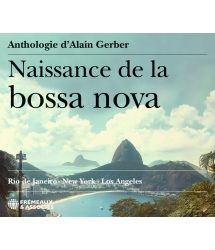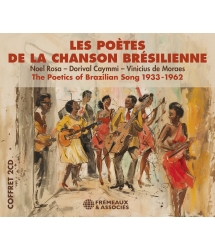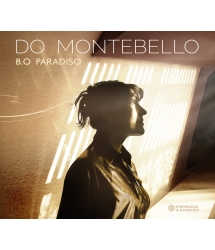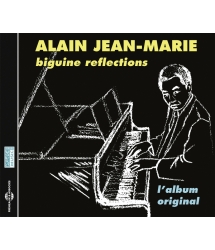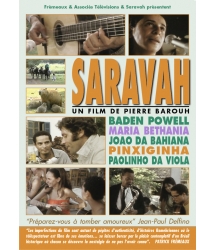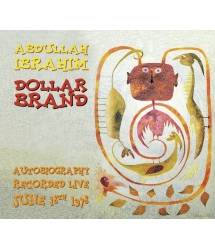- Our Catalog
- Philosophy
- Philosophers of the 20th century and today
- History of Philosophy (PUF)
- Counter-History and Brief Encyclopedia by Michel Onfray
- The philosophical work explained by Luc Ferry
- Ancient thought
- Thinkers of yesterday as seen by the philosophers of today
- Historical philosophical texts interpreted by great actors
- History
- Books (in French)
- Social science
- Historical words
- Audiobooks & Literature
- Our Catalog
- Jazz
- Blues
- Rock - Country - Cajun
- French song
- World music
- Africa
- France
- Québec / Canada
- Hawaï
- West Indies
- Caribbean
- Cuba & Afro-cubain
- Mexico
- South America
- Tango
- Brazil
- Tzigane / Gypsy
- Fado / Portugal
- Flamenco / Spain
- Yiddish / Israel
- China
- Tibet / Nepal
- Asia
- Indian Ocean / Madagascar
- Japan
- Indonesia
- Oceania
- India
- Bangladesh
- USSR / Communist songs
- World music / Miscellaneous
- Classical music
- Composers - Movie Soundtracks
- Sounds of nature
- Our Catalog
- Youth
- Philosophy
- News
- How to order ?
- Receive the catalog
- Manifesto
- Dictionnary











- Our Catalog
- Philosophy
- Philosophers of the 20th century and today
- History of Philosophy (PUF)
- Counter-History and Brief Encyclopedia by Michel Onfray
- The philosophical work explained by Luc Ferry
- Ancient thought
- Thinkers of yesterday as seen by the philosophers of today
- Historical philosophical texts interpreted by great actors
- History
- Books (in French)
- Social science
- Historical words
- Audiobooks & Literature
- Our Catalog
- Jazz
- Blues
- Rock - Country - Cajun
- French song
- World music
- Africa
- France
- Québec / Canada
- Hawaï
- West Indies
- Caribbean
- Cuba & Afro-cubain
- Mexico
- South America
- Tango
- Brazil
- Tzigane / Gypsy
- Fado / Portugal
- Flamenco / Spain
- Yiddish / Israel
- China
- Tibet / Nepal
- Asia
- Indian Ocean / Madagascar
- Japan
- Indonesia
- Oceania
- India
- Bangladesh
- USSR / Communist songs
- World music / Miscellaneous
- Classical music
- Composers - Movie Soundtracks
- Sounds of nature
- Our Catalog
- Youth
- Philosophy
- News
- How to order ?
- Receive the catalog
- Manifesto
- Dictionnary
FERNANDO MARTINS - EDSON LOBO - NELSON SERRA
Ref.: FA562
EAN : 3448960256223
Artistic Direction : Yves Chalberland pour Studio Davout et Paulo Martins pour Frémeaux & Associés
Label : Frémeaux & Associés
Total duration of the pack : 35 minutes
Nbre. CD : 1
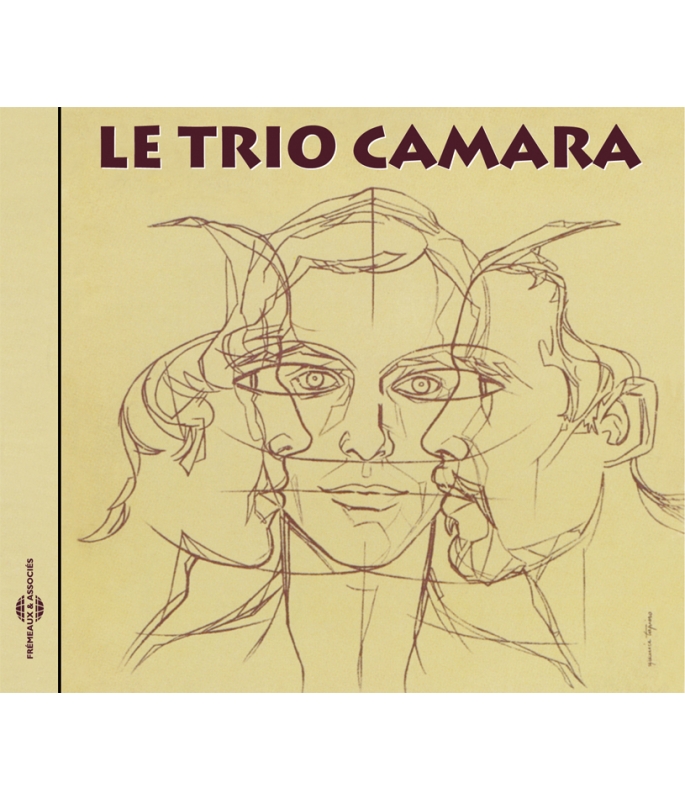
FERNANDO MARTINS - EDSON LOBO - NELSON SERRA
FERNANDO MARTINS - EDSON LOBO - NELSON SERRA
“Good news for lovers of Brazilian music: the cult-album by the Trio Camara, first released in 1968 on Pierre Barouh’s Saravah label, has finally been reissued. The music made by the trio of Fernando Martins, Edson Lobo and Nelson Serra is in the little-known samba jazz style, an instrumental form in parallel with the bossa nova. New listeners can now discover for themselves the kind of music that was played in the many clubs of Rio de Janeiro and São Paulo between 1963 and 1967: masterful performances of standards like Baden Powell’s Berimbau or Edu Lobo’s Upa neguinho appear here alongside rarer themes such as Antonio Carlos Jobim’s Estrada do sol and João Donato’s Muito à vontade. This is popular, accessible music made by musicians of skill and sophistication... a pure marvel. Lovers of Brazilian music are lucky indeed.” Paulo MARTINS
-
PisteTitleMain artistAutorDurationRegistered in
-
1BerimbauFernando Martins, Edson Lobo, Nelson Serra00:03:061968
-
2Nao Tem SolucaoFernando Martins, Edson Lobo, Nelson Serra00:04:591968
-
3BiaFernando Martins, Edson Lobo, Nelson Serra00:01:471968
-
4NascenteFernando Martins, Edson Lobo, Nelson Serra00:04:521968
-
5Estrada Del SolFernando Martins, Edson Lobo, Nelson Serra00:02:431968
-
6Upa NeguinhoFernando Martins, Edson Lobo, Nelson Serra00:01:481968
-
7Feitio De OracaoFernando Martins, Edson Lobo, Nelson Serra00:01:551968
-
8ChegancaFernando Martins, Edson Lobo, Nelson Serra00:03:551968
-
9Noa NoaFernando Martins, Edson Lobo, Nelson Serra00:04:281968
-
10Muito A VontadeFernando Martins, Edson Lobo, Nelson Serra00:02:321968
-
11Samba NovoFernando Martins, Edson Lobo, Nelson Serra00:03:351968
Le trio Camara FA562
LE TRIO CAMARA
L’histoire du Brésil des années 1950 est marquée par le retour à la démocratie.Les brésiliens élisent Juscelinho Kubitschek. Une révolution culturelle se met en place : cinéma, poésie, architecture (Brasilia), et musique avec, bien-sûr, la merveilleuse invention de la bossa nova mais également une renaissance de la musique instrumentale que l’on désignera ultérieurement par samba-jazz.
Dès le milieu des années 50, des jam sessions sont organisées dans les clubs de Copacabana à Rio de Janeiro avec des musiciens tels que : Johnny Alf, Radamés Gnatalli, João Donato…Ils travaillent à la fusion de différents styles de l’époque : samba, boléro, baião, jazz… et intéressent particulièrement de jeunes musiciens tels qu’Antonio Carlos Jobim, João Gilberto, Roberto Menescal, Luizinho Eça…D’ailleurs Alain Tercinet dans le livret de son excellent coffret “Jazz West Coast” (référence FA5281 Frémeaux & Associés), nous rappelle combien tous ces jeunes musiciens étaient influencés par le jazz et suivaient de près ses nouveautés, notamment les productions du label Pacific Jazz qui étaient très bien distribuées à Rio.D’autre part la musique classique européenne apporta sa richesse harmonique. Notons que le très jeune A.C. Jobim prit des cours de piano avec le musicien allemand Hans Joachim Koëllreutter, qui eut une influence déterminante dans les sphères de la musique classique. Le samba-jazz arrive à maturité au début des années 1960. Il est représenté par de nombreuses formations dont les plus marquantes sont :
A Rio : Bossa trés, dirigé par son pianiste, Luis Carlos Vinhas ; Tamba trio, dirigé par Luiz Eça (sans doute le plus grand pianiste brésilien de son époque) ; Bossa Rio sextet dirigé par Sergio Mendes (qui participa au fameux concert du Carnegie Hall le 21 novembre 1962 où la Bossa Nova fut révélée au monde entier).
A São Paulo : Zimbo trio dirigé par son pianiste Amilton Godoy Sambalanço trio dirigé par Cesar Camargo Mariano (le futur époux de la chanteuse Elis Regina).
Toutes ces formations réalisent de nombreux LP’s et accompagnent toutes les vedettes de la Bossa Nova dans leurs projets.C’est dans ce contexte foisonnant que Fernando Martins, Edson Lobo et Nelson Serra forment le trio Camara et commencent à travailler ensemble.Mais en avril 1964, le Général Castelo Branco accède au pouvoir avec l’appui de la junte militaire et établit un régime dictatorial. L’exaltante digression qui avait bercé le Brésil va bientôt s’achever.Des artistes s’organisent pour s’élever contre la censure naissante. La canção de protesto (chanson de protestation) fait son apparition. Parallèlement en 1966 les maisons de disques décrètent la fin de la lune de miel avec toute forme de musique instrumentale pour promouvoir la chanson ou M.P.B. (Musica Popular Brasileira) sous l’impulsion du succès de la pop musique et du rock.Beaucoup de musiciens n’ont alors d’autre choix que de partir pour les Etats-Unis ou l’Europe.
Au même moment, Tita une jeune chanteuse et guitariste est remarquée par Eddie Barclay au Copacabana Hôtel lors d’un festival de la chanson à Rio. Il lui propose de venir à Paris enregistrer un album. Elle accepte le projet.Tita n’est autre que la compagne d’Edson Lobo. Pour enregistrer son album “L’incomparable Tita”, elle est assistée de sa section rythmique qui n’est autre que le trio Camara. L’album reçoit un très bon accueil.Le trio est invité également à participer à un album d’un groupe vocal au nom mystérieux “Les Masques”, composé de Pierre Vassiliu, Nicole Croisille et d’anciens membres des Double-Six.C’est alors que Pierre Barouh, grand amoureux de la musique brésilienne, qui venait de créer son label Saravah en 1966, propose au trio Camara d’enregistrer tout un album instrumental produit par Yves Chamberland.L’aboutissement en est l’album présenté ci-joint.Le trio connaît alors un franc succès.Mais brusquement nos amis assistent de près aux évènements de mai 68 et c’est ainsi que Tita et Edson, inquiets face à la tournure des évènements, décident de rentrer au Brésil – tandis que Fernando et Nelson continuent leur carrière en France et en Europe.C’est ainsi que le trio Camara n’enregistrera qu’un seul et unique album.
Le Trio nous propose 11 thèmes.
Il nous interprète deux originaux “Bia” de Fernando Martins, “Nascente” de Edson Lobo, de grands standards désormais, tels que “Berimbau” de Baden Powell ou “Upa neguinho” de Edu Lobo, mais également des thèmes plus rares tels que “Estrada do sol” de A.C. Jobim aux harmonies toutes debussystes, “Muito a vontade” du sous-estimé João Donato, le superbe “Samba novo” du guitariste Durval Ferreira etc…Cet enregistrement est précieux car il est un authentique témoignage d’un épisode très créatif de la musique brésilienne et aujourd’hui quelque peu oublié. Certains le considèrent comme l’un des plus beaux albums de samba-jazz.A souligner également la superbe pochette du disque réalisée par le graphiste et peintre Maurice Tapiero.
Paulo MARTINS
© Frémeaux & Associés
english notes
The history of Brazil in the 1950’s was marked by a return to democracy with the election of Juscelinho Kubitschek. A cultural revolution was installed, in films, poetry, architecture (Brasilia) and music particularly, with not only the marvellous invention of bossa nova but also a renaissance in instrumental music, later designated as samba-jazz.As early as the middle of the decade, jam-sessions were organised in clubs from Copacabana to Rio de Janeiro, featuring such musicians as Johnny Alf, Radamés Gnatalli, João Donato… They worked on a fusion of the period’s contemporary styles: samba, bolero, baião, jazz… and they attracted interest from young musicians like Antonio Carlos Jobim, João Gilberto, Roberto Menescal or Luizinho Eça. In his introduction to the excellent set Jazz West Coast (Frémeaux & Associés, FA5281), Alain Tercinet reminds us of the extent of jazz’ influence on all these young musicians; they closely followed all the new releases on the Pacific Jazz label, easily available in Rio. European classical music was also influential, contributing rich harmonies: as a young man, Jobim took piano lessons from the German musician Hans Joachim Koëllreutter, and his influence was decisive in classical music spheres.Samba-jazz matured at the beginning of the Sixties and was represented by many formations, the most remarkable of which were, in Rio, Bossa Trés, led by its pianist, Luis Carlos Vinhas; Tamba Trio, led by Luiz Eça, who was probably the greatest Brazilian pianist of the period; and Sergio Mendes’ Bossa Rio Sextet (which took part in the famous concert given at Carnegie Hall on November 21st 1962, when bossa nova was revealed to the world).
Two groups stood out in São Paulo: the Zimbo Trio of pianist Amilton Godoy, and the Sambalanço Trio led by Cesar Camargo Mariano, who later married singer Elis Regina.All these groups made numerous recordings released on LP, and they regularly accompanied all the Bossa Nova stars in their various projects; it was in this lavish context that Fernando Martins, Edson Lobo and Nelson Serra founded the Trio Camara and began working together. In April 1964, however, General Castelo Branco came to power, backed by the military junta; he established a dictatorship, and the enthralling musical digression that had grown up with Brazil would soon come to an end. Artists banded together against the new censors: the protest song, canção de protesto, made its appearance.In parallel, record companies declared in 1966 that the honeymoon enjoyed by instrumental music was over: they began promoting pop songs — M.P.B. or Musica Popular Brasileira — under the impulse of pop and rock-music hits. The only option now, for many musicians, was self-imposed exile in the USA or Europe. At this time, a young singer-guitarist named Tita was spotted by French record-company owner Eddie Barclay at the Copacabana Hotel, during a Rio song festival. Barclay offered her the chance to make a record in Paris, and she accepted. The man in Tita’s life was none other than Edson Lobo, and when the time came for her to record her album The incomparable Tita she was assisted by his rhythm-section: in other words, the Trio Camara. The album was extremely well-received, and the Trio was invited to appear on an album by a vocal group bearing the mysterious name “Les Masques”: the “masks” were in fact French pop-stars Pierre Vassiliu and Nicole Croisille, plus former members of the Double-Six vocal jazz-group.
1966 was also the year when Pierre Barouh, a great fan of Brazilian music, founded his label called Saravah. Two years later, Barouh invited the Trio Camara to record an entire album of instrumentals, and it was produced by Yves Chamberland. The result is this album, a hit. Paris was in the throes of May 1968, complete with student-demonstrations and social upheaval; Tita and Edson, anxious about their future and the turn taken by events, decided to return to Brazil. As for Fernando and Nelson, they continued their careers in France and Europe. This album was to be their only recording together. The CD contains eleven titles. Two of them are originals, Bia by Fernando Martins and Nascente by Edson Lobo, and both are now great standards, like Baden Powell’s Berimbau or Edu Lobo’s Upa neguinho. There are also rarer tunes, such as Estrada do sol by Antonio Carlos Jobim, with its Debussy-like harmonies. Muito a vontade was written by the underestimated João Donato, and the superb tune Samba novo was composed by guitarist Durval Ferreira.Complete with a superb sleeve by the graphic-artist and painter Maurice Tapiero, this is a precious recording because it genuinely testifies to an extraordinarily creative period in Brazilian music, a period that is today rather forgotten. It is also considered by many to be one of the finest samba-jazz records ever made.
Paulo MARTINS
English translation: Martin DAVIES
© Frémeaux & Associés
Boa noticía para os fãs de musica brasileira.O disco culto do Trio Camara està finalmente disponível novamente.LP lançado inicialmente pela Saravah, editora de Pierre Barouh, em 1968.Fernando Martins, Edson Lobo e Nelson Serra, finalmente realisaram um disco de um estilo desconhecido : o samba jazz, estilo instrumental, paralelo a bossa nova, e permite de descobrir a música que foi desenvolvida em muitos clubes de Rio de Janeiro e de São Paulo meados dos anos 1960.Eles executam tão brilhantemente standards tais como “Berimbau” de Baden Powell e “Upa neguinho” de Edu Lobo, mas também temas mais raros tais como, “Muito a vontade” de João Donato e “Samba novo” de Durval Ferreira.Musica ao mesmo tempo erudita e acessível, popular e sofisticada.Uma maravilha.Para descobrir ou redescobrir urgentemente.
Paulo Martins
discographie
1. Berimbau (Baden Powell) 3’05
2. Não tem solução (Dorival Caymmi) 4’58
3. Bia (Fernando Martins) 1’47
4. Nascente (Edson Lobo) 4’52
5. Estrada do sol (Antonio Carlos Jobim) 2’43
6. Upa Neguinho (Edu Lobo) 1’47
7. Feitio de oração (Noel Rosa) 1’54
8. Chegança (Edu Lobo) 3’54
9. Noa noa (Sergio Mendes) 4’27
10. Muito á vontade (João Donato) 2’31
11. Samba novo (Durval Ferreira) 3’33
Fernando MARTINS : Piano
Edson LOBO : Basse
Nelson SERRA : Batterie
Produit en 1968 par Yves Chamberland et initialement paru sur le label Saravah de Pierre Barouh.
CD Le Trio Camara © Frémeaux & Associés (frémeaux, frémaux, frémau, frémaud, frémault, frémo, frémont, fermeaux, fremeaux, fremaux, fremau, fremaud, fremault, fremo, fremont, CD audio, 78 tours, disques anciens, CD à acheter, écouter des vieux enregistrements, albums, rééditions, anthologies ou intégrales sont disponibles sous forme de CD et par téléchargement.)
